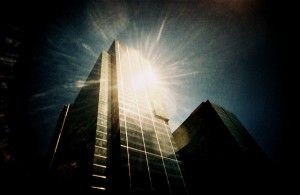Russian scientists develop new glass coating technique
Russian researchers at the National Research Nuclear University Moscow Engineering Physics Institute (MEPhI) have developed a new technique for applying coatings to hard surfaces. The device, a plasma generator, creates a high-intensity magnetron discharge in melted materials. The device evaporates melted matter and enables the rapid application of high-quality thin-films. This approach to glass coating combines the advantages of two coating techniques – magnetron deposition and vacuum evaporation – that can individually create a high quality or rapidly produced coating, but not both.
Glass coating technique could be used for other materials
The new glass coating technique has potential for other materials, too. Currently, coated glass is used heavily in the construction industry to help control glare and heat gain in buildings that make extensive use of glass. The coatings must be high quality in order to work, which significantly slows the rate at which the glass can be produced.
The technique could also be used to apply both preservative and decorative coatings to building materials, tools and filters. The team is currently working on a production-scale prototype. The prototype will not be available commercially, but it takes the technique one step closer to commercialization.
Various forms of magnetron deposition and vacuum evaporation have been in development since the 1980’s. The ability to apply specialized coatings to glass has enabled the commercialization of energy-efficient and insulating glass in construction worldwide.
Glass coating plays an increasingly important role in energy efficiency and construction technology. Glass is a special material because unlike most construction materials, it isn’t porous. Its impervious surface means that ordinary coatings won’t stick to glass over a long period of time. Glassprimer™ glass paint was specially engineered to modify the surface of glass at the nanoscale level. This allows the paint to adhere permanently to glass without chipping, fading or peeling, even when exposed to humidity and direct sunlight.
Glassprimer™ glass paint is a cost-effective glass coating that can help reduce or eliminate the penetration of invisible light frequencies that are responsible for solar heat gain. Glassprimer™ glass paint can be dyed to match virtually any paint palette from any major paint manufacturer. It can be incorporated into virtually any decorating scheme, and is suitable for both indoor and outdoor use.
If you’d like more information about Glassprimer™ glass paint, please visit the rest of our site. If you’d like to purchase Glassprimer™ glass paint, please visit our online store .
Photo Credit: Jared Tarbell, via Flickr.com



